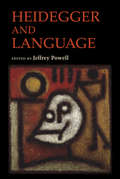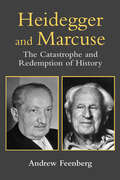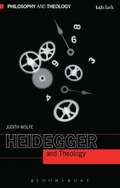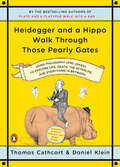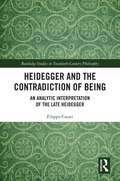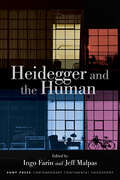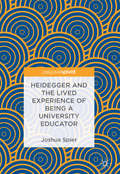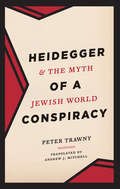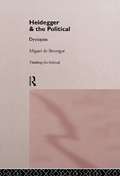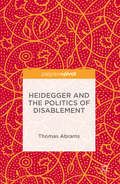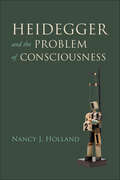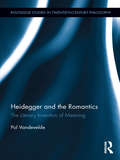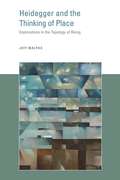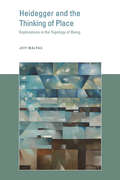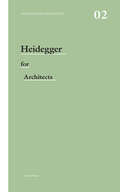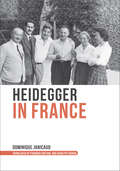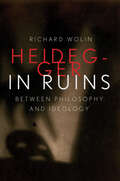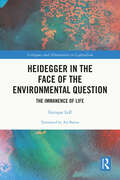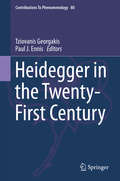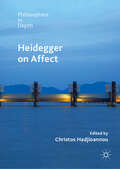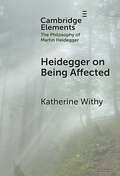- Table View
- List View
Heidegger and Language
by Jeffrey PowellThe essays collected in this volume take a new look at the role of language in the thought of Martin Heidegger to reassess its significance for contemporary philosophy. They consider such topics as Heidegger's engagement with the Greeks, expression in language, poetry, the language of art and politics, and the question of truth. Heidegger left his unique stamp on language, giving it its own force and shape, especially with reference to concepts such as Dasein, understanding, and attunement, which have a distinctive place in his philosophy.
Heidegger and Marcuse: The Catastrophe and Redemption of History
by Andrew FeenbergFirst published in 2005. Routledge is an imprint of Taylor & Francis, an informa company.
Heidegger and Theology (Philosophy and Theology)
by Judith Wolfe Laurence Hemming<p>Martin Heidegger is the 20th century theology philosopher with the greatest importance to theology. A cradle Catholic originally intended for the priesthood, Heidegger's studies in philosophy led him to turn first to Protestantism and then to an atheistic philosophical method. Nevertheless, his writings remained deeply indebted to theological themes and sources, and the question of the nature of his relationship with theology has been a subject of discussion ever since. <p>This book offers theologians and philosophers alike a clear account of the directions and the potential of this debate. It explains Heidegger's key ideas, describes their development and analyses the role of theology in his major writings, including his lectures during the National Socialist era. It reviews the reception of Heidegger's thought both by theologians in his own day (particularly in Barth and his school as well as neo-Scholasticism) and more recently (particularly in French phenomenology), and concludes by offering directions for theology's possible future engagement with Heidegger's work.</p>
Heidegger and Unconcealment
by Mark A. WrathallThis book includes ten essays that trace the notion of unconcealment as it develops from Heidegger's early writings to his later work, shaping his philosophy of truth, language, and history. "Unconcealment" is the idea that what entities are depends on the conditions that allow them to manifest themselves. This concept, central to Heidegger's work, also applies to worlds in a dual sense: first, a condition of entities manifesting themselves is the existence of a world; and second, worlds themselves are disclosed. The unconcealment or disclosure of a world is the most important historical event, and Heidegger believes there have been a number of quite distinct worlds that have emerged and disappeared in history. Heidegger's thought as a whole can profitably be seen as working out the implications of the original understanding of unconcealment.
Heidegger and a Hippo Walk Through Those Pearly Gates: Using Philosophy (and Jokes!) to Explore Life, Death, the Afterlife, and Everything in Between
by Thomas CathcartFrom the authors of the bestselling Plato and a Platypus Walk into a Bar, an uproarious new book on the meaning of death (and life, too) The new book by the bestselling authors of Plato and a Platypus Walk Into a Bar is a hilarious take on the philosophy, theology, and psychology of mortality and immortality. That is, Death. The authors pry open the coffin lid on this one, looking at the Big D and also its prequel, Life, and its sequel, the Hereafter. Philosophers such as Schopenhauer, Nietzsche, Camus, and Sartre have been wrestling with the meaning of death for as long as they have been wrestling with the meaning of life. Fortunately, humorists have been keeping pace with the major thinkers by creating gags about dying. Death’s funny that way—it gets everybody’s attention. Death has gotten a bad rap. It’s time to take a closer look at what the Deep Thinkers have to say on the subject, and there are no better guides than Cathcart and Klein. .
Heidegger and his Anglo-American Reception: A Comprehensive Approach (Contributions to Phenomenology #119)
by John Rogove Pietro D’OrianoThis book presents both a historical overview of the absorption of Heidegger’s thought into English-language philosophical schools as well as a philosophical discussion of his thought provided by contemporary scholars. The text describes the ways in which a philosophical methodology and worldview seemingly so inhospitable to Anglophone academia has managed to find an unlikely home.This volume is roughly divided into two types of contributions: discussions of Heidegger’s reception in the English-speaking world, and outstanding examples of English-language Heidegger scholarship. The first type includes both historiographical accounts of the encounters between Heidegger’s thought and the Anglo-American world, as well as their philosophical expositions and critiques. The second group of chapters reveal the latest contemporary scholarship by contemporary Heideggerians writing in English. It is moreover the first volume to bring together thinkers from both genealogies of Anglo-American Heideggerianism appealing to students and researchers working in both of these camps.
Heidegger and the Contradiction of Being: An Analytic Interpretation of the Late Heidegger (Routledge Studies in Twentieth-Century Philosophy)
by Filippo CasatiThis book offers a clear, analytic, and innovative interpretation of Heidegger’s late work. This period of Heidegger’s philosophy remains largely unexplored by analytic philosophers, who consider it filled with inconsistencies and paradoxical ideas, particularly concerning the notions of Being and nothingness. This book takes seriously the claim that the late Heidegger endorses dialetheism – namely the position according to which some contradictions are true – and shows that the idea that Being is both an entity and not an entity is neither incoherent nor logically trivial. The author achieves this by presenting and defending the idea that reality has an inconsistent structure. In doing so, he takes one of the most discussed topics in current analytic metaphysics, grounding theory, into a completely unexplored area. Additionally, in order to make sense of Heidegger’s concept of nothingness, the author introduces an original axiomatic mereological system that, having a paraconsistent logic as a base logic, can tolerate inconsistencies without falling into logical triviality. This is the first book to set forth a complete and detailed discussion of the late Heidegger in the framework of analytic metaphysics. It will be of interest to Heidegger scholars and analytic philosophers working on theories of grounding, mereology, dialetheism, and paraconsistent logic.
Heidegger and the Elements of (Elements in the Philosophy of Martin Heidegger)
by S. Montgomery EwegenBy way of an analysis of Heidegger's use of the elements of earth, water, air, and fire as a means to describe the unfolding of being, this Element offers a novel account of Heidegger's understanding of the human. By covering a variety of texts from the late-20s through the early-50s (including several of his recently published Black Notebooks), this Element demonstrates the manner in which these elements comprise, for Heidegger, the very being of the human.
Heidegger and the Human: Heidegger And The Human (SUNY series in Contemporary Continental Philosophy)
by Jeff Malpas Ingo FarinThe human being stands at the center of the humanities and social sciences. In an age that some have dubbed the Anthropocene, this book addresses Heidegger's conception of the human being and its role in the world. Contributors discuss how Heidegger envisages and interprets the human being and what we can learn from his thought. Pluralistic in outlook, this volume covers a broad range of divergent views on Heidegger and his complex conception of the human. A short introductory chapter orients the reader to the significance of the question of the human in Heidegger's works, its topicality, and its relevance for interpreting Heidegger's oeuvre. Chapters are divided into three thematic groups: anthropology and philosophy; human being, otherness, and world; and life, identity, and finitude. This organization facilitates discussions of the systematic interconnection between Heidegger's philosophy and his critical thoughts on anthropology and humanism, as well as his relation to contemporary philosophers and their views on the subject. Various problems in Heidegger's concept of the human are addressed, and moral dimensions and practical imperatives implicit in Heidegger explored in discussions about intersectionality and oppression, the frailty of the human, and the embeddedness of the human being in nature, society, and history.
Heidegger and the Lived Experience of Being a University Educator
by Joshua SpierThis book explores the lived meanings of being a university educator from an existential perspective. The book enriches our understanding of educators' experiences in light of Martin Heidegger's early philosophy, and vice versa (opening our understanding of Heidegger's philosophy through educators' experiences). Also drawing on the philosophical insights of Hans-Georg Gadamer, the book situates the purposes and experiences of the ‘educator’ in historical and contemporary contexts. In doing so, the author reveals that being a university educator is essentially characterised by conversation and time. Inspired by the author’s own experiences of teaching community development and sociology within a youth-work specific bachelor degree, the book invites educators to apply existential philosophy as a tool to reflect upon their own experiences and to reconnect with the question of what it means to be an educator in their shared world of practice. This thoughtful volume is sure to resonate with the experiences of readers who educate within a university context.
Heidegger and the Myth of a Jewish World Conspiracy
by Andrew J. Mitchell Peter TrawnyIn 2014, the first three volumes of Heidegger's Black Notebooks--the personal and philosophical notebooks that he kept during the war years--were published in Germany. These notebooks provide the first textual evidence of anti-Semitism in Heidegger's philosophy, not simply in passing remarks, but as incorporated into his philosophical and political thinking itself. In Heidegger and the Myth of a Jewish World Conspiracy, Peter Trawny, the editor of those notebooks, offers the first evaluation of Heidegger's philosophical project in light of the Black Notebooks. While Heidegger's affiliation with National Socialism is well known, the anti-Semitic dimension of that engagement could not be fully told until now. Trawny traces Heidegger's development of a grand "narrative" of the history of being, the "being-historical thinking" at the center of Heidegger's work after Being and Time. Two of the protagonists of this narrative are well known to Heidegger's readers: the Greeks and the Germans. The world-historical antagonist of this narrative, however, has remained hitherto undisclosed: the Jews, or, more specifically, "world Judaism." As Trawny shows, world Judaism emerges as a racialized, destructive, and technological threat to the German homeland, indeed, to any homeland whatsoever. Trawny pinpoints recurrent, anti-Semitic themes in the Notebooks, including Heidegger's adoption of crude cultural stereotypes, his assigning of racial reasons to philosophical decisions (even undermining his Jewish teacher, Edmund Husserl), his endorsement of a Jewish "world conspiracy," and his first published remarks on the extermination camps and gas chambers (under the troubling aegis of a Jewish "self-annihilation"). Trawny concludes with a thoughtful meditation on how Heidegger's achievements might still be valued despite these horrifying facets. Unflinching and systematic, this is one of the most important assessments of one of the most important philosophers in our history.
Heidegger and the Political (Thinking the Political)
by Miguel de BeisteguiRecent studies of Heidegger's involvement with National Socialism have often presented Heidegger's philosophy as a forerunner to his political involvement. This has occured often to the detriment of the highly complex nature of Heidegger's relation to the political. Heidegger and the Political redresses this imbalance and is one of the first books to critically assess Heidegger's relation to politics and his conception of the political.Miguel de Beistegui shows how we must question why the political is so often displaced in Heidegger's writings rather than read the political into Heidegger. Exploring Heidegger's ontology where politics takes place after a forgetting of Being and his wish to think a site more originary and primordial than politics, Heidegger and the Political considers what some of Heidegger's key motifs - his emphasis on lost origins, his discussions of Holderlin's poetry, his writing on technology and the ancient Greek polis - may tell us about Heidegger's relation to the political. Miguel de Beistegui also engages with the very risks implicit in Heidegger's denial of the political and how this opens up the question of the risk of thinking itself.Heidegger and the Political is essential reading for students of philosophy and politics and all those interested in the question of the political today.
Heidegger and the Politics of Disablement
by Thomas AbramsThis book presents the early existential phenomenology of Martin Heidegger as a way to reformulate academic disability studies and activist disability politics. It redresses the almost categorical neglect of human difference in the philosophy of Heidegger. It proceeds by applying a revised version of his phenomenology to social policy aimed to get disabled persons to work and to methods in rehabilitation science intended to be more 'client friendly'. Phenomenological philosophy is extended to the topic of disability, while, at the same time, two key concerns facing disability studies are addressed: the roles of capitalism in disablement, and of medical practice in the lives of disabled persons. By reframing disability as a lived way of being in the world, rather than bodily malfunction, the book asks how we might rethink medicine and capitalism in democratic ways. It aims to transform Heidegger's work in light of his troubling politics to produce a democratic social theory of human difference.
Heidegger and the Problem of Consciousness
by Nancy J. HollandNancy J. Holland turns to the thought of Martin Heidegger to help understand an age-old philosophical question: Is there a split between the body and the mind? Arguing against philosophical positions that define human consciousness as an overarching phenomenon or reduce it to the brain or physicality, Holland contends that consciousness is relational and it is this relationship that allows us to inhabit and negotiate in the world. Holland forwards a complex and nuanced reading of Heidegger as she focuses on consciousness, being, and what might constitute the animal or, more broadly, other-than-human world. Holland engages with the depth and breadth of Heidegger's work as she opens space for a discussion about the uniqueness of human consciousness.
Heidegger and the Romantics: The Literary Invention of Meaning (Routledge Studies in Twentieth-Century Philosophy)
by Pol VandeveldeWhile there are many books on the romantics, and many books on Heidegger, there has been no book exploring the connection between the two. Pol Vandevelde’s new study forges this important link. Vandevelde begins by analyzing two models that have addressed the interaction between literature and philosophy: early German romanticism (especially Schlegel and Novalis), and Heidegger’s work with poetry in the 1930s. Both models offer an alternative to the paradigm of mimesis, as exemplified by Aristotle’s and Plato’s discussion of poetry, and both German romanticism and Heidegger owe a deep debt to Plato. The study goes on to defend the view that Heidegger was influenced by romanticism. The author’s project is thus both historical, showing the specificity of the romantic and Heideggerean works, and systematic, defending aspects of their alternative mode of thinking while also pointing to their weaknesses.
Heidegger and the Thinking of Place
by Jeff MalpasThe idea of place--topos--runs through Martin Heidegger's thinking almost from the very start. It can be seen not only in his attachment to the famous hut in Todtnauberg but in his constant deployment of topological terms and images and in the situated, "placed" character of his thought and of its major themes and motifs. Heidegger's work, argues Jeff Malpas, exemplifies the practice of "philosophical topology. " In Heidegger and the Thinking of Place, Malpas examines the topological aspects of Heidegger's thought and offers a broader elaboration of the philosophical significance of place. Doing so, he provides a distinct and productive approach to Heidegger as well as a new reading of other key figures--notably Kant, Aristotle, Gadamer, and Davidson, but also Benjamin, Arendt, and Camus. Malpas, expanding arguments he made in his earlier book Heidegger's Topology (MIT Press, 2007), discusses such topics as the role of place in philosophical thinking, the topological character of the transcendental, the convergence of Heideggerian topology with Davidsonian triangulation, the necessity of mortality in the possibility of human life, the role of materiality in the working of art, the significance of nostalgia, and the nature of philosophy as beginning in wonder. Philosophy, Malpas argues, begins in wonder and begins in place and the experience of place. The place of wonder, of philosophy, of questioning, he writes, is the very topos of thinking.
Heidegger and the Thinking of Place: Explorations in the Topology of Being (The\mit Press Ser.)
by Jeff MalpasThe philosophical significance of place—in Heidegger's work and as the focus of a distinctive mode of philosophical thinking.The idea of place—topos—runs through Martin Heidegger's thinking almost from the very start. It can be seen not only in his attachment to the famous hut in Todtnauberg but in his constant deployment of topological terms and images and in the situated, “placed” character of his thought and of its major themes and motifs. Heidegger's work, argues Jeff Malpas, exemplifies the practice of “philosophical topology.” In Heidegger and the Thinking of Place, Malpas examines the topological aspects of Heidegger's thought and offers a broader elaboration of the philosophical significance of place. Doing so, he provides a distinct and productive approach to Heidegger as well as a new reading of other key figures—notably Kant, Aristotle, Gadamer, and Davidson, but also Benjamin, Arendt, and Camus.Malpas, expanding arguments he made in his earlier book Heidegger's Topology (MIT Press, 2007), discusses such topics as the role of place in philosophical thinking, the topological character of the transcendental, the convergence of Heideggerian topology with Davidsonian triangulation, the necessity of mortality in the possibility of human life, the role of materiality in the working of art, the significance of nostalgia, and the nature of philosophy as beginning in wonder. Philosophy, Malpas argues, begins in wonder and begins in place and the experience of place. The place of wonder, of philosophy, of questioning, he writes, is the very topos of thinking.
Heidegger for Architects (Thinkers for Architects)
by Adam SharrInforming the designs of architects as diverse as Peter Zumthor, Steven Holl, Hans Scharoun and Colin St. John Wilson, the work of Martin Heidegger has proved of great interest to architects and architectural theorists. The first introduction to Heidegger’s philosophy written specifically for architects and students of architecture introduces key themes in his thinking, which has proved highly influential among architects as well as architectural historians and theorists. This guide familiarizes readers with significant texts and helps to decodes terms as well as providing quick referencing for further reading. This concise introduction is ideal for students of architecture in design studio at all levels; students of architecture pursuing undergraduate and postgraduate courses in architectural theory; academics and interested architectural practitioners. Heidegger for Architects is the second book in the new Thinkers for Architects series.
Heidegger in France (Studies in Continental Thought)
by Dominique JanicaudDominique Janicaud claimed that every French intellectual movement—from existentialism to psychoanalysis—was influenced by Martin Heidegger. This translation of Janicaud's landmark work, Heidegger en France, details Heidegger's reception in philosophy and other humanistic and social science disciplines. Interviews with key French thinkers such as Françoise Dastur, Jacques Derrida, Éliane Escoubas, Jean Greisch, Philippe Lacoue-Labarthe, Jean-Luc Marion, and Jean-Luc Nancy are included and provide further reflection on Heidegger's relationship to French philosophy. An intellectual undertaking of authoritative scope, this work furnishes a thorough history of the French reception of Heidegger's thought.
Heidegger in Ruins: Between Philosophy and Ideology
by Richard WolinWhat does it mean when a radical understanding of National Socialism is inextricably embedded in the work of the twentieth century’s most important philosopher? Martin Heidegger’s sympathies for the conservative revolution and National Socialism have long been well known. As the rector of the University of Freiburg in the early 1930s, he worked hard to reshape the university in accordance with National Socialist policies. He also engaged in an all-out struggle to become the movement’s philosophical preceptor, “to lead the leader.” Yet for years, Heidegger’s defenders have tried to separate his political beliefs from his philosophical doctrines. They argued, in effect, that he was good at philosophy but bad at politics. But with the 2014 publication of Heidegger’s Black Notebooks, it has become clear that he embraced a far more radical vision of the conservative revolution than previously suspected. His dissatisfaction with National Socialism, it turns out, was mainly that it did not go far enough. The notebooks show that far from being separated from Nazism, Heidegger’s philosophy was suffused with it. In this book Richard Wolin explores what the notebooks mean for our understanding of arguably the most important philosopher of the twentieth century, and of his ideas—and why his legacy remains radically compromised.
Heidegger in the Face of the Environmental Question: The Immanence of Life (Critiques and Alternatives to Capitalism)
by Enrique LeffThis volume engages with the work of Heidegger to argue that the modern environmental crisis is fundamentally a crisis of understanding Life, resulting from the symbolic codification of the world from the Logos of Greek philosophy to the rationality of the modern world and resulting in a metaphysics that privileges ontological thinking on the "question of being" over the environmental question and the concern for the conditions of life. Exploring the work of the three principal thinkers of the Lebensphilosophie— Bergson, Dilthey, and Husserl—it charts the itinerary of Heidegger’s work and exposes its conflicts with the work of Marx, Plessner, Haar, and Derrida. A critical argument against the colonization of the world by Eurocentric reason and for the deconstruction of Capital, Heidegger in the Face of the Environmental Question draws on Latin American environmental thought to re-think the conditions for life on Earth. It will therefore appeal to scholars of philosophy, political theory, and political sociology with interests in environmental philosophy, political ecology, and socioeconomic transformation.
Heidegger in the Twenty-First Century
by Tziovanis Georgakis Paul J. EnnisThe current volume is comparative and inter-disciplinary, and it provides a reflection on what thinking might become after Heidegger's philosophy. Its aim is to critically expand the current field of research by presenting unfamiliar and unchartered avenues that will guide and carry the Heidegger scholarship into the twenty-first century. By doing so, it addresses fundamental questions in the Heideggerian scholarship, including its problems, restraints, and future direction. It also engages and broadens the increasingly disparate approaches to Heidegger's work, whether those approaches are traditional in their employment of phenomenology and hermeneutics or whether they apply to Heidegger's thinking in new and surprising ways. The first section of the volume emphasizes the importance of methodology for the future of Heidegger studies while the second section examines the historical, ethical and vocal-poetical in Heidegger's thought and draws conclusions relevant to the Heidegger scholar of today. The final section demonstrates Heidegger's appeal to a variety of other discourses besides philosophy and the way his thinking could be creatively approached, utilized and implemented in our century. Contributions come from cutting-edge scholars such as Babette E. Babich, Dermot Moran, François Raffoul and Trish Glazebrook.
Heidegger on Affect (Philosophers in Depth)
by Christos HadjioannouThis book offers the first comprehensive assessment of Heidegger’s account of affective phenomena. Affective phenomena play a significant role in Heidegger’s philosophy — his analyses of mood significantly influenced diverse fields of research such as existentialism, hermeneutics, phenomenology, theology and cultural studies. Despite this, no single collection of essays has been exclusively dedicated to this theme. Comprising twelve innovative essays by leading Heidegger scholars, this volume skilfully explores the role that not only Angst plays in Heidegger’s work, but also love and boredom. Exploring the nature of affective phenomena in Heidegger, as well as the role they play in wider philosophical debates, the volume is a valuable addition to Heideggerian scholarship and beyond, enriching current debates across disciplines on the nature of human agency.
Heidegger on Being Affected (Elements in the Philosophy of Martin Heidegger)
by Katherine WithyThings get to us. We are moved or affected by 'things' in the ordinary sense=the paraphernalia of our daily lives-and also by ourselves, by others, and by ontological phenomena such as being and time. How can such things get to us? How can things matter to me? Heidegger answers this question with his concepts of finding (Befindlichkeit) and attunement (Stimmung). This Element explores how being finding allows things to matter to us in attunements such as fear and hope by allowing those things to show up as benefits or detriments to our pursuits and so to put those pursuits at stake. It also explores how we can be affected ontologically-that is, affected by being-in special attunements such as angst and boredom, as well as how Heidegger's account of being affected has contributed to our understanding of emotions, moods, and affective disorders.
Heidegger on Being Uncanny
by Katherine WithyThere are bizarre moments when we feel like strangers to ourselves. Through an investigation of Heidegger's concept of uncanniness, Katherine Withy explores what such experiences reveal. She shows that we can be what we are only if we do not fully understand what it is to be us, and points toward what it is to live well as an uncanny human being.
